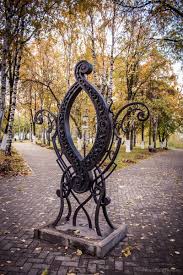In the
podcast, I speak in Moscow dialect of the Russian language.
Why is
it Moscow dialect? Firstly, Moscow dialect is
considered to
be the model of
pronunciation which is something similar to Received
Pronunciation in the English language. And, secondly, I am
from Moscow
and
this is the dialect I speak, know and studied.
Russia is a
large country and people living in various parts of it speak
differently, using different words, grammar and often different
pronunciation.
For
example, in the north
people say Os [o] – окают [Okay-oo-t]. There
is even a monument to the letter “O” in Vologda
(Northwest Russia).

So in
Vologda the word МОЛОКО is
pronounced as [molokO]. All Os.
The words
can differ. For example, in the southern dialects the word for
“to talk” is ГУТОРИТЬ [g-oo-tor-ee-t’]
while in Moscow we say ГОВОРИТЬ [gavar-ee-t’].
Considering
all these varieties of dialects, there was an economical,
political and even practical necessity to have a dialect of Russian
language
which would be understood everywhere in Russia.
And for
historical and political reasons Moscow dialect was chosen to be
the one, and now it is the standard of the Russian literary language
and
considered to be the standard of the pronunciation. Moscow dialect
became a
universal language which can be understood by any person no matter in
which part
of Russia he lives.
And of
course, Moscow dialect is the language of media; governmental and
official bodies and education.
The main
characteristics of Moscow dialect are
so-called:
Аканье [Akanye]
–
pronouncing A instead of O in an unaccented position,
and
Иканье [-EE-kanye]
–
saying И instead
of E in an unaccented syllable.
Ivan
the
Terrible (Tsar Ivan IV) and Muscovites in the
XVI century were
still saying Os in the words just like their neighbours in the North.
Аканье [Akanye]
developed in Moscow dialect only after the XVI century, when Moscow
princedom
started uniting (“collecting”) northern and southern territories around
Moscow.
It was then that the dialects began mixing and developing in Moscow
dialect.
Due to its geographical location and political significance Moscow became a cauldron for mixing and adapting the various dialects of the Russian language.





